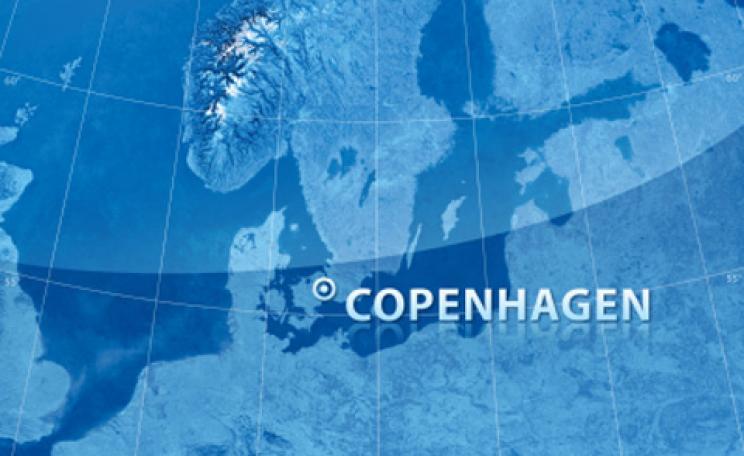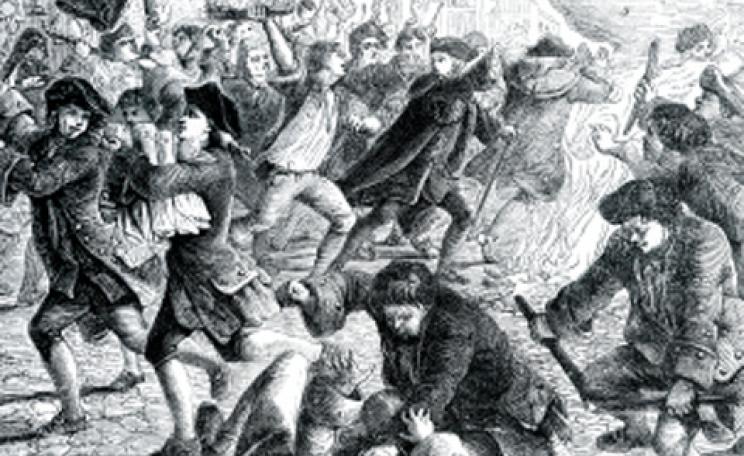There are three things to be said for waiting four hours in the dark, freezing cold outside a conference center in Copenhagen, as I did this Monday morning.
The first is unprintable.
The second is smugness that I waited four hours less than later-rising colleagues, who only pitch up after dawn to the Bella Center, base camp for the climate talks. But most importantly was the chance to chat to some high quality delegates in that most democratic of UN institutions, the queue.
Herd instinct
Inside, tribal law holds sway, with delegates moving in herds through packed halls, trailing a cloud of journalists the density of which varies in proportion to the delegation’s political clout. Chance encounters can certainly be engineered – the smoking area is fertile hunting ground, as are the corridors outside the offices where national delegations and working groups meet.
But the whole process is a lot more casual outside in the queue, where a more egalitarian atmosphere is detectable, the green glitterati rubbing shoulders with climate protesting proles. Throw in a dose of Dunkirk spirit (stoical attitudes to long, dank waits are evidently not unique to the Brits) and you have a recipe for unlikely new pals and useful gossip.
My own queue-mates were a youth activist who had spent the night trying to sleep on a table, and a jolly Canadian woman, who turned out to be Elizabeth May, leader of the country’s Green Party. We passed the next four hours quite pleasantly, discussing the Canadian government under Stephen Harper (it sucks, apparently) and instigating Mexican waves back along a queue now numbering hundreds of people. I like to think that Al Gore raised his hands – he was an hour or so behind us at one point.
Inside the centre, a colleague related her own queue story. A man was speaking in agitated French to security guards who would not let him in. Offering to translate, she discovered him to be the president of a small African country, arriving for the crucial second week of the talks.
The world in a queue
These contrasting experiences – my fortuitous access to a political leader, and another political leader’s bad luck – are logistical flukes, in part. But they offer an intriguing microcosm of the UNFCCC process, which is at the same time avowedly even-handed and yet operationally exclusive in terms of how deals get done.
Who makes decisions, and how, is a highly charged issue at these talks. The number of people allowed inside the Bella Center – totaling 15,000 in the first week – is being dramatically reduced as heads of state start to arrive for the last hours of the climate summit. On Friday, the day talks are scheduled to finish, only 90 observers will be allowed into the talks in total.
This rationing has stirred anger among environmental and human rights activists who have travelled here from all over the world, and want their voice to be heard. The climate protests that took place in central Copenhagen last weekend sent a strong message to the watching world. But for many campaigners there is no substitute for being inside the Bella Center, where the only limits to accosting decision-makers are ‘patience and courage’, in the words of one stalwart environmental advocate.
‘Sheer numbers’ might be an additional ingredient in the recipe for ear-bending success. With so many forums for discussion, it pays to scatter delegates far and wide like seed, in the hope they will grow on a negotiator. Larger organisations are undoubtedly at an advantage here, a fact that applies to states as much as non-governmental groups. This harks back to the African president’s experience in the queue. The lack of manpower available to delegations from poorer states is a recognised impediment to their full participation in multilateral talks.
The least worst solution
At the final reckoning, access to decision-making is for naught without influence. The power play between nation states over climate policy has been widely reported. With the hours ticking away until the talks conclude, the outcome is still uncertain as many ministers pass the final decision up to their heads of state. This raises the prospect of presidents and prime ministers riding to the rescue – maybe riding roughshod over months of more participatory negotiations in the run-up to the summit.
Procedural imperfections come with the territory of reaching agreement between the 192 nations gathered at COP-15. I heard one former negotiator claim it was ‘impossible’ to negotiate the UN text in an open, transparent way.
Whether he is right or not is a moot point. Certainly, there are no easy fixes for existing processes. This does not stop the thinking delegate from feeling a sense of unease – one told me he is in a state of ‘existential crisis’ over the whole thing.
Angst-ridden or not, the UNFCCC is still the best practical tool we have for creating a global climate deal. As the talks enter the end-game, let us hope for more queue encounters of the positive kind.
Harriet Williams works for the Environmental Funders Network, and writes here in a personal capacity
| READ MORE... | |
 |
NEWS Monsanto named worst corporate climate lobbyist US company wants its GM crops to be given carbon credits and to be at the forefront of tackling climate change despite link to deforestation |
 |
NEWS Todd Stern: 'the US is doing a lot' US chief climate negotiator, Todd Stern, argues about baselines at Copenhagen, and tells delegates that the US is 'doing a lot' |
 |
NEWS ANALYSIS Copenhagen: peasant farmers can save the planet Carbon reduction potential of ecological farming methods is highlighted at Copenhagen, as protests against industrial agriculture gather strength |
 |
NEWS ANALYSIS Copenhagen could lead to increase in intensive farming All sectors must play their part in a global emissions deal, but could including agriculture in the mix lead to an intensification of farming and money for GM crops? |
 |
PODCAST Climate expert: Copenhagen is 'four years behind the science' Head of the Potsdam Institute and climate change advisor to the German government, Professor John Schellnhuber explains why COP15 is based on out-of-date science, but why he still has hope for a positive outcome |







